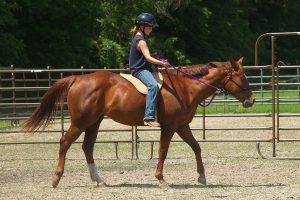What If You Get Injured Riding A Horse?
 Michael Babboni
Personal Injury
Even though Florida is best known for being the tropical state where boating and sprawling amusement parks like Disneyworld are the things to do and places to go, that’s not the only kind of fun the state affords. That same sunny, mild weather can also make the state a pleasant environment for animals and animal lovers. Equine activities like riding a horse, or even participating in sports like polo are easy to do here in Florida, and many people partake in these more unique forms of recreation. But, just like any form of recreation, there’s no such thing as a 100% risk free activity, and this is especially true when it comes to riding a living form of conveyance, like a horse, that has a mind of its own.
Michael Babboni
Personal Injury
Even though Florida is best known for being the tropical state where boating and sprawling amusement parks like Disneyworld are the things to do and places to go, that’s not the only kind of fun the state affords. That same sunny, mild weather can also make the state a pleasant environment for animals and animal lovers. Equine activities like riding a horse, or even participating in sports like polo are easy to do here in Florida, and many people partake in these more unique forms of recreation. But, just like any form of recreation, there’s no such thing as a 100% risk free activity, and this is especially true when it comes to riding a living form of conveyance, like a horse, that has a mind of its own.You Are Only In Partial Control
Of course, the biggest hazard when it comes to riding any large animal is the combination of power and autonomy that an animal like a horse has. Despite its size, a horse is not a car, and the only reason a horse follows your commands is because it has been trained and chooses to do so. The second a horse decides it no longer wants to listen to you, or it becomes powerfully emotionally provoked—such as when surprised or afraid—it will do whatever it wants, regardless of your commands.
This is something that every potential horse rider has to understand, and it is something that has been built into the type of insurance coverage that protects the owners of ranches and other facilities where it is possible to ride a horse. Because no one can guarantee complete control of an animal—especially depending on how the rider treats the animal—it is a bit more difficult for people to sue the owner of a horse if an injury should occur.
For example, if it is going to rain soon, and thunder clouds are already rumbling, and a horse is known to get nervous when thunder rumbles, an owner may warn a rider of this. If the customer chooses to ignore this warning and take the horse for a ride anyway, should thunder in the sky cause the horse to panic, rear up and throw the rider, that rider cannot sue the horse owner. There were strict warnings given about the horse’s behavior that the rider chose to ignore, so the owner did due diligence.
Responsible Management
On the other hand, if a horse is unsuitable for riders, and a horse owner does NOT take steps to ensure a safe experience, then you may have a case for negligence and a personal injury lawsuit. The most extreme example of this is if a horse is known to be disagreeable and intolerant of all but the most experienced rider. If a horse owner does NOT disclose any of this, but allows a rider or even a child to get on the horse, the resulting injury could conceivably go to court.
It’s always down to the specific circumstances behind an incident that determine the weight of a case. An experienced personal injury lawyer has the knowledge and background to quickly assess the merits of your own case.
